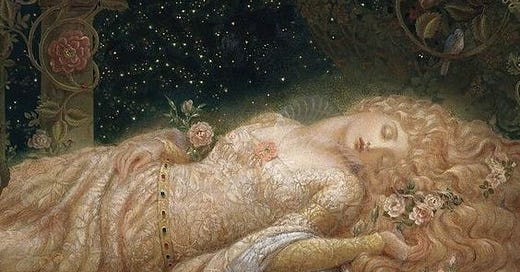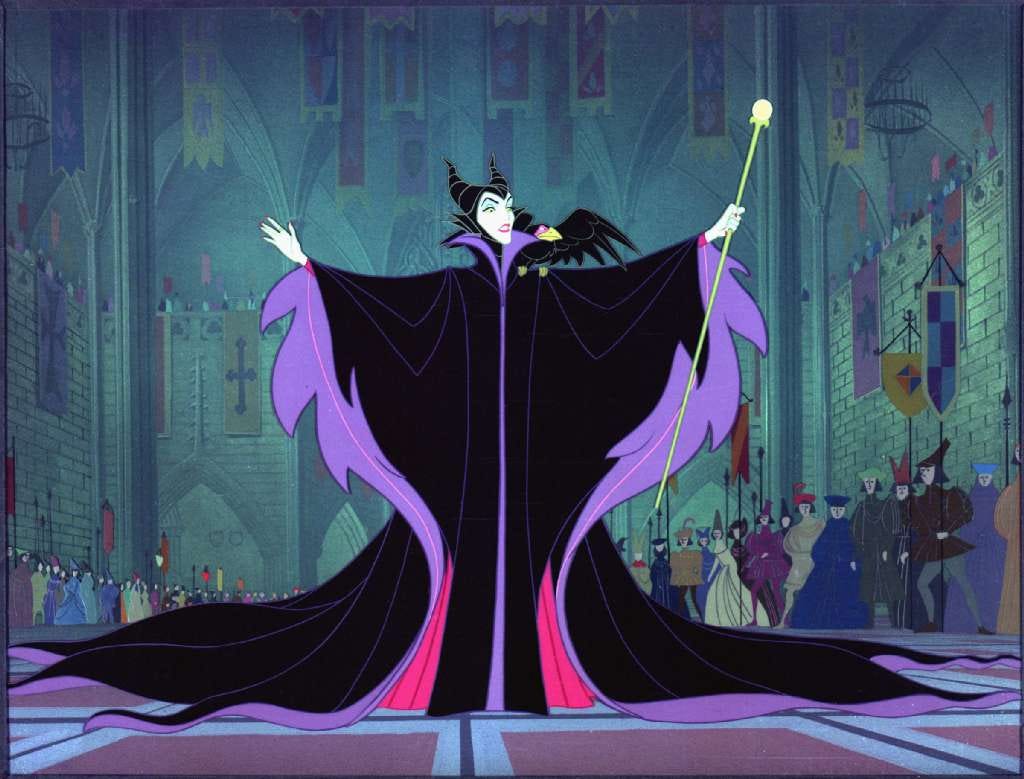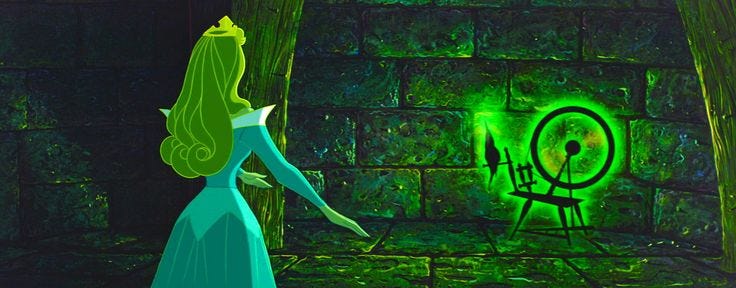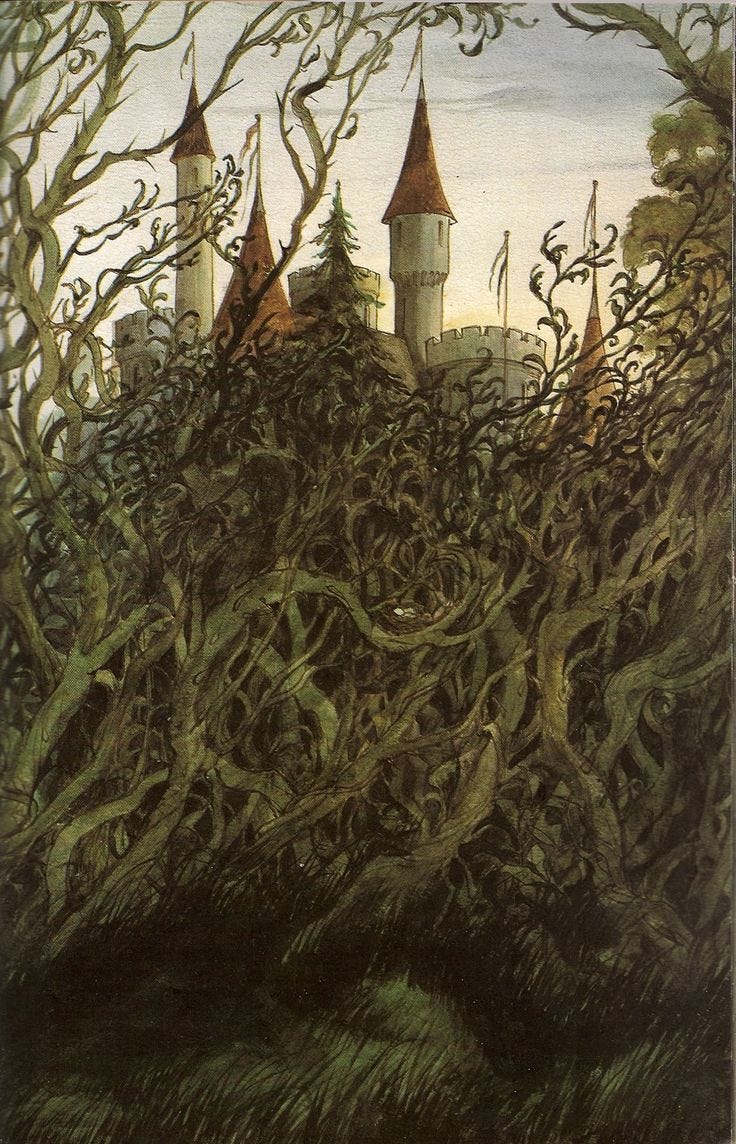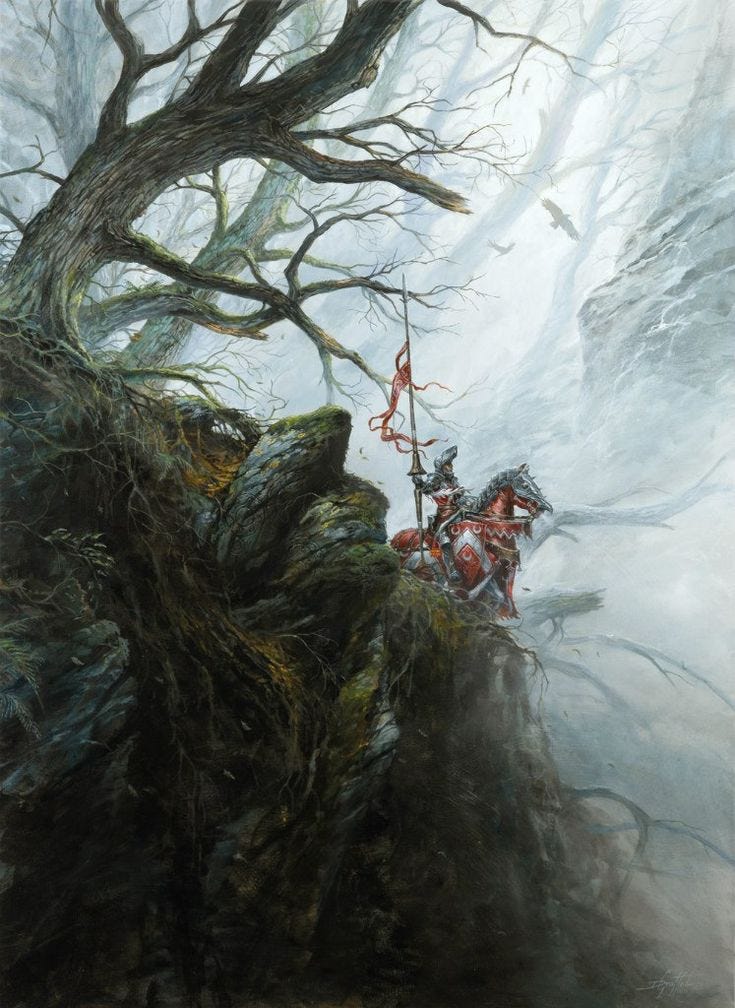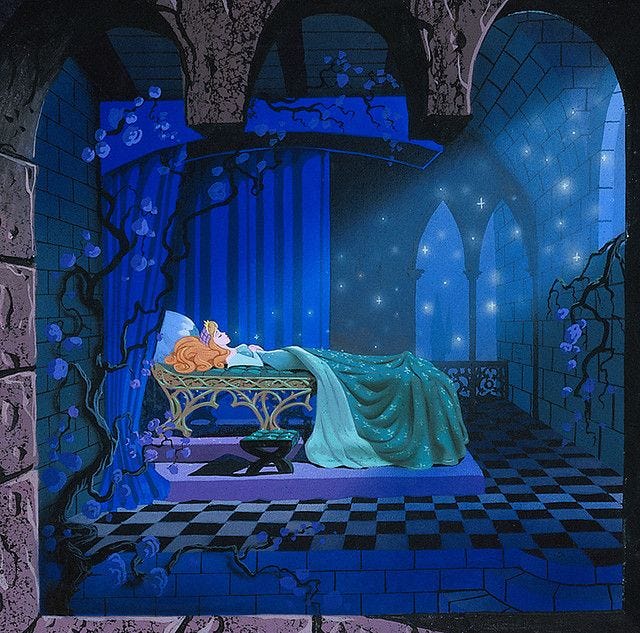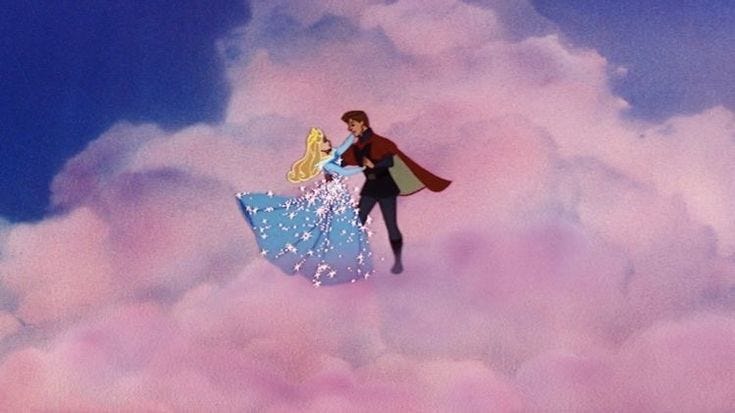Recently I celebrated one year of sobriety. In the past year, I tried to untangle my thoughts on alcohol from societal conditioning. The best way to convey my thoughts is through my favourite medium: a fairytale analysis. I’ll be bringing my subjective experience to retell you Sleeping Beauty with what I have learned.
It’s important to note that fairytales were originally passed on as oral stories told by many voices, and these people wrote them down and embellish them as they wished. For the purpose of the analysis, I’ll be referring to Perrault’s version. If you’d like to read the whole story, you can read a translation here.
The Sleeping Beauty begins with the birth of Aurora. After years of trying, the King and Queen finally have a child. There was a craving for joy and innocence. Babies are the closest we ever get to God or Source, as they are the purest form of ourselves: without ego or grudges or preconceived ideas. They are fully present, experiencing the world for the first time through all their senses. A baby represents new beginnings; specifically, a baby girl is the birth of feeling. Aurora, whose name means dawn or light, symbolises our consciousness.
A christening, a spiritual cleansing, is held so the fairies can bestow gifts on Aurora. The fairies bestow gifts on her like most beautiful, temper of an angel, perfect dancer, talented musician. But what the fairies are really bestowing on her is potential. We are born perfect. We already have everything we need. The rest of our lives is a series of choices that, if we base our decisions on how things feel, we find our authentic selves.
However, an aged fairy who no one thought to invite enters the christening late. It is always the way with the shadow. The undesired (aging, ugliness, sadness, bitterness, a death of sorts) can show up unannounced at any time. We are always very unhappy about it, as we wish we/everything would be perfect all the time, but it’s not. Inevitably, the shadow is going to come crash your party.
Sleeping Beauty (1959)
Believing she had been intentionally slighted by the King and Queen, the old fairy places a curse on Aurora. The shadow will go out of its way to disrupt especially if it hasn’t been paid any attention. The shadow doesn’t like to be ignored, for example you have a sudden angry outburst you didn’t see coming. The shadow will find a way to seize control.
The aged fairy curses Aurora to prick her hand on a spindle and die of it. While technically a death sentence, the aged fairy doesn’t specify when this will happen. Inevitably we will all die. The shadow reminds us of reality, the truth of things we would rather turn away from. Death is also transformation. In tarot, the Death card symbolises negative influences, providing us with the opportunity to change our circumstances and bring our addictions into the light of consciousness. However, a young fairy counteracts the curse with a spell that will cause Aurora to go into a deep sleep for a hundred years. Instead of facing the trueness of life, our mortality or our grief, we go unconscious to avoid it.
Sleeping Beauty (1959)
A few months into sobriety, I observed this feeling about alcohol. I saw it as a distraction from reality and how we use it as an anesthetic for our existential troubles. We live from weekend to weekend, waiting for the next break from being alive. It fucks with our judgment and decision-making by slowing down the brain and shutting down the prefrontal cortex which is responsible for reasoning and impulse control. We literally go unconscious. When we drink alcohol, we temporarily avoid our problems and by doing so we create bigger ones.
The King responds to the curse by removing all spinning needles from the realm. Rather than warning Aurora or teaching her how to use a spinning wheel, the King takes away the lessons she could have learned to remain naive and helpless. The King and court in the story represent our patriarchal society and internal conditioning. Alcohol is an oppressive tool used by capitalism to keep us trapped in a cycle. We overwhelm ourselves with work and relieve our stress by binge drinking so that we have just enough gas to get through the next week of work but not enough to actually do the things we want to do.
The King (masculine) is the part of us that makes it happen. The Queen (feminine) is the part of us that lets it happen. We enable ourselves. We allow ourselves to live in a fantasy. Even when you feel something is not right, you ignore the feeling to preserve the fantasy. The fantasy can be that the drinking is just for fun, even though you’re itching for a drink after a stressful day. The fantasy could be that you were ‘celebrating with friends’ when you can’t remember anything from the night before. After sixteen years, the King and Queen go away “pleasure bent.” We can’t maintain control all the time. When we are too focused on pursuing the ‘good things’ (fun times, relief, relaxation), we let our guard down.
When we are “hasty” and “heedless,” chasing the next drink or the next high, we prick our hand on the needle. Our hands are our second pair of eyes and are what we use to see in the dark. We see with our hands by feeling. We create and destroy with our hands. A spindle is a vessel for transformation, spinning “thread, like time, stretches to a certain length or span” like a life. Suddenly, we prick our finger: without realising it, alcohol becomes a problem. We fall asleep.
Sleeping Beauty by Kinuko Y. Craft
The King resigns to the idea this was inevitable and commands “that she should be left to sleep in peace until the hour of her awakening should come.” In other words, the King absolves himself of any responsibility as he thinks it was bound to happen to her eventually.
The fairy who had cast the spell to fall asleep returns in “her chariot of fire, drawn by dragons” (love that for her) and casts a spell on all the staff in the castle, even Aurora’s pet dog, to awaken at the same time as Aurora. This fairy is the part of us that means well: who strives to fix everything and ‘do better’ but really what we are doing is meddling and over-complicating the issue. We say we need to drink less, exercise more, eat healthier, work harder, have more discipline, drink more water, leave earlier, try this and that – when we should just say “I can use my magic to find a way to wake up.” In other words: stop drinking and see what happens.
The fairy does not cast the spell on the King and Queen. Neither of them object to this either. No one spends any time searching for a prince who can wake their daughter. Aurora’s parents die never speaking to her again. Why do they let this happen?
This passivity mirrors the inaction taken by Big Alcohol when it comes to taking responsibility for the harm alcohol does, like causing cancer or contributing to domestic violence. Part of the problem with Big Alcohol is the DrinkWise label. It is not a government-funded health study which it appears to be. It is just a label slapped on the bottom corner of advertising funded by alcohol companies Asahi, Bacardi, Campari, Carlton and United Breweries, Coopers, Coles Liquor, Penfolds and more. The purpose of this campaign is to remind drinkers that it’s their responsibility to handle their alcohol consumption and to “be smart” about the highly addictive and dangerous substance they are ingesting. Big Alcohol puts the onus back on us, holding up its big ugly hands as if it weren’t the one to have caused the mess. The King and Queen remove themselves from the situation, as apparently, Aurora’s unconsciousness is her problem now.
The Sleeping Beauty by Trina Schart Hyman
Loved ones can be distant from the realities of addiction and misunderstand the person struggling. They may take their loved ones addiction personally, as if they are choosing to be addicted. When this happens, the person struggling with addiction is isolated in their experience. They take on this mentality too, that there is something wrong with them, that something within them is broken and isn’t worth fixing.
Aurora’s isolation causes a thick forest “with interlacing brambles and thorns that neither man nor beast can penetrate them” to grow. In a fairytale, an animal (beast, pet dog) symbolises our intuition. Man (masculine) is our ability to take action. So, due to this thick forest, Aurora is guarded against anything that could help her. We cover the fact we are addicted with the stories we tell ourselves: “there’s something wrong with me,” “I have to be what others want me to be” “I’m scared to be myself.”
The Quest by Didier Graffet
After a hundred years and the throne passing to someone else, a prince hears of the beautiful princess needing to be awoken. The prince, fueled by the audacious vigor of youth, sets out on the mission. A specific kind of tenacity is needed for an awakening. A kind of heroism, as there is something to be conquered, and you need to really believe in yourself to make a lasting change. When the prince arrives at the thick forest, the trees part for him and make a path to the tower. The tangled branches of our shame can be cleared with intention. When you make a decision that points you in the direction of your authentic self, Life clears a path for you. Things become more straightforward, obvious, simple.
When the prince arrives inside the castle, he is terrified to find all the staff asleep holding their “glasses, in which were still some dregs of wine” and “that they had fallen asleep while drinking.” To the masculine, the aspect of us that will initiate action against our problem with alcohol, the fact that they are unconscious because of their drinking is “plain” and evident.
Sleeping Beauty (1959)
The prince finds the sleeping princess and kneels beside her. “The hour of disenchantment had come.” For many of us, there is a moment of disenchantment: a moment that brings you to your knees where you realise the fantasy is not real, and purposeful change needs to take place. We wake up.
The prince stammers out a declaration of love. “The less there is of eloquence, the more there is of love.” A statement that 328 years later still rings true today in many respects. For the purpose of this analogy, it refers to the first few months of sobriety, which is awkward as fuck. No hint of eloquence to be found. Social anxiety, clunky overly detailed explanations, sheer panic. But in that you allow yourself to be and, perhaps for the first time, meet yourself. The staff awakens to help Aurora, and you find you have a strength you didn’t know you had.
Sleeping Beauty (1959)
Sleeping Beauty (1959) ends here and if we were perpetuating the idea that sobriety is the end of all our problems, the analysis would end here too. However, it certainly isn’t, and Perrault’s story continues on after Aurora and the prince get married. They have a daughter, Dawn and a son, Day (again, names meaning light and consciousness). We are also introduced to the Prince’s mother, the Queen, who is an Ogress who wants to eat their children. She is another aspect of the shadow. The Queen’s “ogrish instincts” represent our lower instincts, the toxic things we love to do, like talking shit or binging. In sobriety, the Ogress Queen is still there. However, it is up to us how much control we let her have.
“Allow yourself to slip down that road and you surrender to your lowest instincts."
— Uncle Iroh, Avatar Day, Avatar: The Last Airbender
In Perrault’s The Sleeping Beauty, the prince has to go away to war, leaving Aurora and the children in the castle with the Ogress Queen. She orders her chief steward to bring them to her so that she can eat them. He tricks her by feeding her baby goat and lambs instead.
After ten months of sobriety, I began to examine my motivation behind abstaining from alcohol and discovered it had become more about fear of failure than building self-respect and self-worth. As I approached the one-year mark, I considered how the same Ogress Queen who controlled me (ideas about alcohol for survival) mutated into the same monster with a different face (ideas about sobriety for survival.) I hadn’t vanquished the Ogress Queen, I had just given her something else to eat.
When the Ogress Queen discovers Aurora and the children are alive, she orders a huge vat to be filled with “vipers and toads, with snakes and serpents of every kind” and for the three of them, along with the steward and his wife, to be dropped into it.
As I began to reimagine what my relationship with alcohol meant to me, I had my own encounter with the vat of vipers. Shame, fear of judgment, and failure all twisted and hissed at me when I thought about drinking alcohol. I felt like I would be betraying my mission and that all my positive change would have been for nothing.
“There they were, and her minions were making ready to cast them into the vat…”
Alcohol creates space between me and my thoughts and disconnects me from feeling my body. At one point in time, this would have been a good thing. But I don’t feel that way anymore.
“…when into the courtyard rode the king! Nobody had expected him so soon, but he had traveled posthaste. Filled with amazement, he demanded to know what this horrible spectacle meant. None dared tell him, and at that moment the Ogress, enraged at what confronted her, threw herself head foremost into the vat, and was devoured on the instant by the hideous creatures she had placed in it.”
I no longer think alcohol is necessary. It has lost its power. The Ogress Queen, who had once been so petrifying, throws herself into the vat. At the conclusion of The Sleeping Beauty, the prince (now king) “found ample consolation in his beautiful wife and children.” The family is united and in balance.
After unsubscribing from drinking culture, my priority is sobriety. Being sober is a connection to Source, my highest instincts and the consciousness that flows through all living things. The next chapter in this journey is trusting the strong sense of self I have cultivated, allowing fear to live in the passenger seat without letting it take the wheel. Being affected by alcohol is nowhere near as enjoyable as when I am at my most relaxed and comfortable. True joy is being awake.


